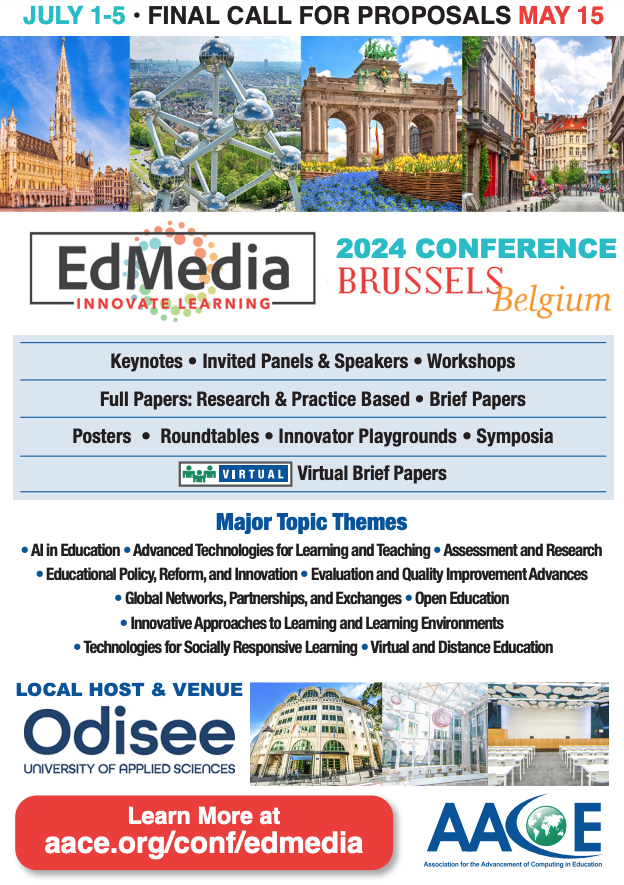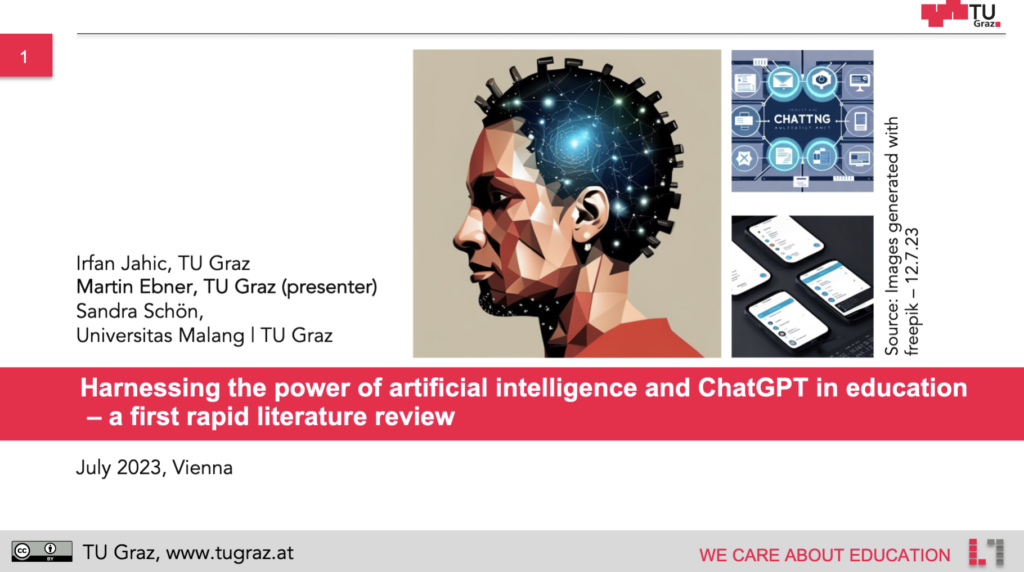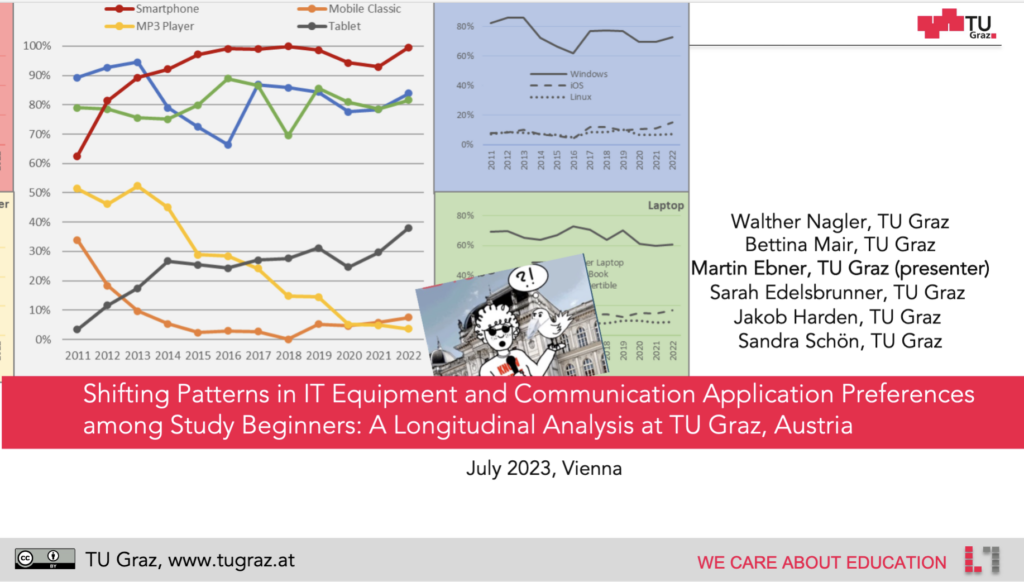I am thrilled to announce the CallForPapers with the deadline of 15th of May, for this year’s EdMedia Conference (1.7-5.7.2024), located in Brussels.
Find here the poster of the call:

[Link to the conference homepage]
I would love to see you there 🙂

Digitale Lehre an und rund um der Technischen Universität Graz
I am thrilled to announce the CallForPapers with the deadline of 15th of May, for this year’s EdMedia Conference (1.7-5.7.2024), located in Brussels.
Find here the poster of the call:

[Link to the conference homepage]
I would love to see you there 🙂
Our research about „Exploring the Utilization of Online Resources and Experiences in Language Learning: A Study of Indonesian Students Learning German as a Foreign Language“ is now online available.
Abstract: This study examines the frequency of online resource utilization among German language students at Universitas Negeri Malang (Indonesia) who are at the B1 level. The aim of the research is to investigate the usage of websites and applications during German language studies. Standardized questions were administered to a sample of 54 students to gather information regarding their engagement with online resources throughout their coursework. Additionally, feedback on selected online resources was collected and assessed. The findings reveal that Indonesian students demonstrate a preference for using videos featuring interviews with native German speakers, alongside the inclusion of supportive subtitles to enhance comprehension. However, a significant challenge arises due to the lack of materials specifically tailored for Indonesian learners, which also clearly indicate the intended language proficiency level.
[preprint @ ResearchGate]
[publication @ publisher’s homepage]
Reference: Ebner, M., Schön, S., Hidayat, E. & Ardiyani, D.K. (2023). Exploring the Utilization of Online Resources and Experiences in Language Learning: A Study of Indonesian Students Learning German as a Foreign Language. In T. Bastiaens (Ed.), Proceedings of EdMedia + Innovate Learning (pp. 1085-1090). Vienna, Austria: Association for the Advancement of Computing in Education (AACE). Retrieved July 17, 2023 from https://www.learntechlib.org/primary/p/222623/.
Our presentation about „Harnessing the power of artificial intelligence and ChatGPT in education -a first rapid literature review“ at the EDMedia and Innovative Learning 2023 conference in Vienna is now online available:

Our conference paper, titled „Practitioner Integrated Education for Vital Computational Thinking Skills„, at EDMedia and Innovative Learning 2023 conference in Vienna is published.
Abstract:
The leap from formal education to a modern work environment is often surprisingly difficult. Having young people struggle in these transitional periods while entrepreneurs and businesses strive to merge new team members is a worthy cause to investigate. The process of teacher education can not adequately cope with the intensity of technological and methodological progress. Based on expert-driven, participatory workshops in Austria, the effects and benefits of practitioner integration are evaluated. In multiple stages based on an action research methodology, the problem-solving approach of Computational Thinking (CT) was introduced to learners aged 16 to 18 (K-12) with the help of outside practitioners. This research project reveals the immense potential of expert integration in a secondary school classroom setting. The primary research question of “What consequences has practitioner integration on Computational Thinking education?” is answered. With the development of sustainable, interdisciplinary interfaces between teaching staff and industry experts a multitude of systemic problems in the educational system can be mitigated and the missing link to Computational Thinking education established. With all involved stakeholders and driven by the needs of young learners a robust and inclusive path to practitioner integrated Computational Thinking education is established.
[draft @ ResearchGate]
[article @ conference’s homepage]
Reference: Pollak, M., Ebner, M. & Sagbauer, N.N. (2023). Practitioner Integrated Education for Vital Computational Thinking Skills. In T. Bastiaens (Ed.), Proceedings of EdMedia + Innovate Learning (pp. 593-602). Vienna, Austria: Association for the Advancement of Computing in Education (AACE). Retrieved August 31, 2023 from https://www.learntechlib.org/primary/p/222704/.
Our anual study results were traditional presented at the EDMedia and Innovative Learning 2023 conference in Vienna titled „Shifting Patterns in IT Equipment and Communication Application Preferences among Study Beginners: A Longitudinal Analysis at TU Graz, Austria„. Here are the slides:

Our publication titled „Makification – Bridging the Gap between Formal and Maker Education“ was presented at EDMedia and Innovative Learning 2023 conference and got published right now.
Abstract: To achieve appropriate education for the future, we propose a gradual process of makification in which characteristic elements of the maker movement are incorporated into formal educational activities. Using the existing literature, we deduce the need for a shift from teacher-centered to student-centered learning while integrating essential 21st century skills into the rigid framework of formal education through makification
[preprint @ ResearchGate]
[publication @ publisher’s homepage]
Reference: Sagbauer, N.N., Pollak, M. & Ebner, M. (2023). Makification – Bridging the Gap between Formal and Maker Education. In T. Bastiaens (Ed.), Proceedings of EdMedia + Innovate Learning (pp. 264-271). Vienna, Austria: Association for the Advancement of Computing in Education (AACE). Retrieved July 19, 2023 from https://www.learntechlib.org/primary/p/222513/
Our research publication titled „Developing an Addition and Subtraction Trainer with Automated Categorization of Errors for Learners in Their First Two Years of Primary School“ for the EDMedia and Innovative Learning 2023 conference is published.
Abstract: This paper discusses the development and testing of a gamified mathematical learning app. Said app is designed for primary school children in their first two years of learning, so that they can practice the arithmetic operations addition and subtraction in a playful way. Predefined error categories are used to specifically eliminate weaknesses. As an incentive for the learners, mascots, stars and a child-oriented look are offered, as well as a mode in which the players can compete with others worldwide and, in the case of good performance, find themselves on the leaderboard. A test run and a subsequently conducted survey with 49 school children showed that the app generally works well and that the subjective perceptions regarding the motivational ability of the mascots correlate with the overall perception of the app.
[preprint @ ResearchGate]
[publication @ publisher’s homepage]
Reference: Zöhrer, H., Wachtler, J. & Ebner, M. (2023). Developing an Addition and Subtraction Trainer with Automated Categorization of Errors for Learners in Their First Two Years of Primary School. In T. Bastiaens (Ed.), Proceedings of EdMedia + Innovate Learning (pp. 832-843). Vienna, Austria: Association for the Advancement of Computing in Education (AACE). Retrieved July 19, 2023 from https://www.learntechlib.org/primary/p/222586/.
Our publication titled „The Development of Two Math E-Learning Systems for Primary School Children in Android“ for the EDMedia and Innovative Learning 2023 conference is now online available:
Abstract: Electronic learning, with all its different variations, approaches and applications, is a very relevant topic in today’s education. E-Learning is a wide field, as it affects classes in school as well as training scenarios for adult persons. This work describes the development of two E-Learning systems: EinMalEins Trainer and Division Trainer. Both applications are part of the learning lab of Graz University of Technology. This document sums up the theoretical background of the development process as well as the realization. A lot of emphasis in this work laid on applying different testing methods, therefore thinking aloud testing as well as automated testing are handled more deeply. The methodology behind these methods is explained and the results are presented.
[Preprint @ ResearchGate]
[Publication @ Publisher’s homepage]
Reference: Plieschnegger, M., Wachtler, J. & Ebner, M. (2023). The Development of Two Math E-Learning Systems for Primary School Children in Android. In T. Bastiaens (Ed.), Proceedings of EdMedia + Innovate Learning (pp. 798-810). Vienna, Austria: Association for the Advancement of Computing in Education (AACE). Retrieved July 19, 2023 from https://www.learntechlib.org/primary/p/222581/
Our publication about the results of the welcome days, titled „Shifting Patterns in IT Equipment and Communication Application Preferences among Study Beginners: A Longitudinal Analysis at Graz University of Technology, Austria“, is now online available.
Abstract: Within the last 11 years, more than 10.000 students participated in surveys amongst study beginners at Graz University of Technology (TU Graz) in Austria. In autumn 2022, 1,089 students answered questions on their IT equipment, social media, and communication applications. While the evaluations of the last few years did not reveal major changes, this year is different: The apps Tiktok and Discord, newly introduced as an option in the survey, get equally large shares-of one-third and more than 40%, respectively. For the first time, the presentation of the survey data also includes questions regarding the usage of communication applications for learning. That shall give rise to future research on communication apps for teaching at TU Graz.
[draft @ ResearchGate]
[publication @ publisher’s homeage]
Reference: Nagler, W., Mair, B., Ebner, M., Edelsbrunner, S., Harden, J. & Schön, S. (2023). Shifting Patterns in IT Equipment and Communication Application Preferences among Study Beginners: A Longitudinal Analysis at Graz University of Technology, Austria. In T. Bastiaens (Ed.), Proceedings of EdMedia + Innovate Learning (pp. 104-111). Vienna, Austria: Association for the Advancement of Computing in Education (AACE). Retrieved July 14, 2023 from https://www.learntechlib.org/primary/p/222491/.
Our conference paper, titled „Examining the Digitization Level of First-Year Students at Graz University of Technology (Austria): Insights from a Digitization Index„, at EDMedia and Innovative Learning 2023 conference in Vienna is published.
Abstract: The Educational Technology team at Graz University of Technology (TU Graz) tried to measure the degree of digitization among first-year students (n=1,029). To achieve this, a digitization index was constructed that incorporates various dimensions of digitization, including IT equipment, digital skills, and usage of digital applications for learning. The index is based on two existing studies, the German D21-Digital-Index and the Austrian DiKoS study. It was adapted to fit the context of first-year students at university. The study revealed an average digitization level among first-year students at TU Graz was 39.60 on a scale from 0 to 100. The analysis of specific groups indicated variations in the degree of digitization. Female students, students under 20 and over 25 years old, as well as those from natural sciences and mathematics fields exhibited lower levels of digitization compared to their counterparts. Furthermore, students who attended grammar school before university had lower digitization levels compared to those from higher vocational schools or secondary technical schools. Based on the digitization index, the students are classified into three groups: digital laggards, digital center, and digital leaders. Most first-year students fell into the digital center category, while a smaller proportion were identified as digital laggards or leaders. These groups differed in terms of their device ownership, digital skills, and usage of digital applications.
[publication @ ResearchGate]
[publication @ proceeding’s homepage]
Reference: Mair, B., Martin, E., Edelsbrunner, S., Nagler, W. & Schön, S. (2023). Examining the Digitization Level of First-Year Students at Graz University of Technology (Austria): Insights from a Digitization Index. In T. Bastiaens (Ed.), Proceedings of EdMedia + Innovate Learning (pp. 1128-1136). Vienna, Austria: Association for the Advancement of Computing in Education (AACE). Retrieved July 14, 2023 from https://www.learntechlib.org/primary/p/222629/.